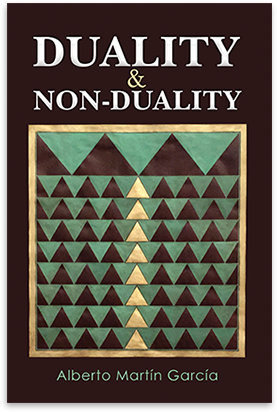
BS Bh by Shankara:
Before going further, the following is a quotation from the Introduction to BS Bh by Shankara:
“It is on the presupposition of this mutual superimposition of the self and the non-self, called avidya that all conventions of the means and objects of right knowledge – whether secular or sacred – proceed, as also all the Sastras dealing with injunction and prohibition or final release.”
The author cannot ignore that, and, indeed, under the section ‘In What Sense can Avidy¯a be Called Mutual Superimposition of the Real and Unreal?’ he states: “It is not completely incorrect to say that avidy¯a is the mutual superimposition of the real and unreal. ´ San˙ kar¯ac¯arya and Sure´svar¯ac¯arya do mention this, e.g., :de :h-A.a:tma:na.eaH I+ta:=e ;ta.=-A:Dya.a.=:ea:pa:Na.a in the prose section of Upade´s¯ahasr¯ı 2.62. This is because the superimposition of an observer on the inner-self naturally leads to the reverse process of superimposing the inner-self on the inner organ. But note the important fact that the reverse superimposition is that of the self onto the ego-mind-body complex. No where do we [find] statements that avidy¯a is the mutual superimposition of the real and unreal by the mind”. This is followed by some complicated argumentation I will not go into.
Here comes a rather important point; at least this is the way I see it: IS SUPERIMPOSITION PRIOR, SUBSEQUENT TO, OR COINCIDENTAL WITH IGNORANCE (AVIDYA)? Certainly, superimposition amounts to ignorance, which in most cases can be used as its synonym. This issue will be further elaborated in subsequent posts.
The author continues: “… And, of course this ego sense is superimposed on the self due to avidy¯a … When the conception of j¯ıva itself is due to avidy¯a [or, alternately, to superimposition?], how can avidy¯a be the ‘natural tendency of the mind to superimpose the self and not-self?’”. We saw two paragraphs above that for him (RB) what is natural is the reverse process: the superimposition of the self on the inner organ only - he seems to give much importance to this point.
One could answer his question thus: “Is not the jiva, together with its internal organ, ‘created’ as by one ‘act’ (an act of pseudo-creation entailing the apparent multiplicity of phenomena, jivas, etc. – which act could be called ‘the principle of individuation’)? Whether this ‘act’ has its locus in Consciousness or in an individual mind (to avoid the contrived notion of ‘universal mind’), the mind thus ‘constituted’ does not need to have a ‘natural tendency’ to superimpose the self and the non-self, since it is already done!”. Reminds one of the first vibration (throb) Ramesam was referring to… “and the subsequent harmless first I-consciousness thought is (in the classical terminology) Isvara.
The subsequent ‘me’ is the ego or I-thought (ahankara vritti).”
In view of the above, the author’s following statements: “The conception of j¯ıva, i.e., the ‘individual soul’, is prior to that of the mind, since the mind is predicated of a j¯ıva.” [And so?]… “In any case, where did the mind spring up from to confuse the self and not-self? Is not the mind itself in the ‘not-self’ category?” -- seem confusing and irrelevant.
Quotes: (1) “It is certainly ironic that SSS’s exposition of avidy¯a has the same problem, namely avidy¯a cannot account for it’s own substrate, namely the mind!”— I already dealt with that.
(2) “SSS misunderstands this superimposition and reverse superimposition as being performed by the mind. SSS’s confused understanding of avidy¯a has rather serious consequences, resulting in his confused understanding the role of ´sruti in facilitating knowledge, and an illogical examination of three states.”
I will try to continue my defence of Swami Satchidanandendra’s (SSS) position in the following submissions.
Post Views : 336